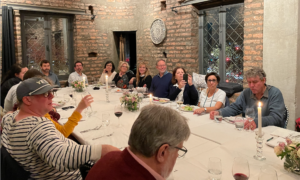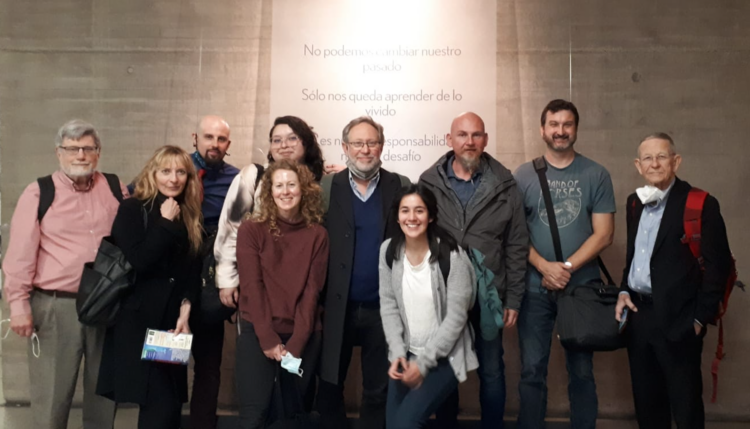
Hybrid, Funny, Dramatic and Back Together after Three Years
IALJS-16 was a conference like no other
I feel I stand firmly on the safe side of truth when I state that the sixteenth conference of the International Association of Literary Journalism Studies (IALJS) was like none of the previous ones.
First, it was devilishly difficult to organize because the COVID, travel, economic and political situation kept changing until the last minute and then more. Problems in the Chilean capital by no way started with the virus. When I agreed to host it at the Universidad Alberto Hurtado in Santiago, Chile, there was no pandemic in sight in the world and nobody in Chile thought there would be an “estallido social.”
Then this country started a long social upheaval which has led to impressive political, social and constitutional changes. In 2019 the Chilean government was forced to give up two huge meetings: The APEC Asia-Pacific Economic Cooperation Forum, and the World Climate Change COP25. How long will the uprising last? Will the government stand? How would May 2021 look when nobody knew what would happen the following day?
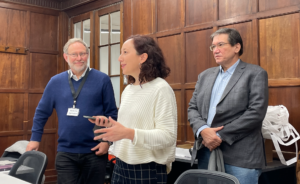
The opening welcome included words from Ximena Orchard, director of the Universidad Alberto Hurtado Journalism Department and Jaime Abello, director general of the Fundación Gabo, pictured here with conference host Roberto Herrscher.
Then COVID made IALJS suspend the fifteenth conference in Copenhagen and move it from 2020 to 2021, and so our Santiago gig was set for 2022. Then the vaccines painted a rosier future. But new strains of the virus pulled the opening of international travel back. Then Russia invaded Ukraine.
The first fourteen IALJS meetings were fully face-to-face activities, where we all traveled around the world to places famous and unknown. Those three or four days made many of us complete fans of the IALJS gatherings. At least for me, they were wonderful opportunities to meet, discuss our topics and learn about authors and traditions which we had never studied or read. And year after year it formed a siblinghood of those strange creatures who love literature, or journalism, or literary journalism.
The bond was so strong, I believe, that it survived a year without a conference and another one with a fine online one, organized with great precision and generosity by Christine Isager and her team at the University of Copenhagen Department of Communication.
When 2022 came, we decided that we all needed to get together again, but that we couldn’t go back to a completely face-to-face operation. It had to be hybrid. Who would come, who would participate online? How many people were we expecting? The numbers changed every week. Finally, 20 came and more than 50 tuned in for their sessions.
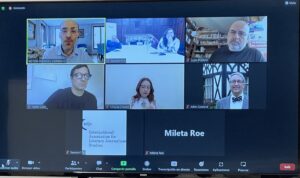
Participants from the online panel “The Latin American Crónica as a Window into a Globalized World / La Crónica latinoamericana como ventana hacia un mundo globalizado” present their work.
Some highlights included our Conference Host Panel, “Literary Journalism and Global Public Goods,” brought to us by an all-Portuguese panel from Universidade de Lisboa, Portugal — Alice Trindade, Isabel Soares, Paulo Martins, and Sónia Pedro Sebastião. The President’s Panel this year, “Blue Thinking: What Joan Didion Meant to Us” grappled with the legacy of a lost giant in the field, with presentations by Isabelle Meuret (Université de Bruxelles, Belgium), Marcela Aguilar Guzmán (Universidad Diego Portales, Chile),John Hartsock (Professor Emeritus, SUNY Cortland, U.S.A.), Monica Martinez (University of Sorocaba, Brazil), and Amber Roessner (University of Tennessee, U.S.A.).
 We were thrilled to present conference travel awards to two graduate students, Sac-Nicté Guevara Calderón (Universidad Iberoamericana, Mexico) and John Brick (Marquette University, U.S.A.). And we celebrated from afar Siobhán McHugh (University of Sydney, Australia), winner of the John C. Hartsock Prize for the Best Article in Literary Journalism Studies, and Bill Reynolds (Toronto Metropolitan University, Canada), winner of the David Abrahamson Prize for the Best Article in the Literary Journalism newsletter. You can read both McHugh’s award-winning research “The Narrative Podcast as Digital Literary Journalism: Conceptualizing S-Town,” and Reynold’s newsletter article on teaching observation, “Writing Exactly What You See: Often Students See More Than They Think,” on the IALJS website. Finally, the Susan Greenberg Prize for Best Research Paper presented at the conference went to Sue Joseph (University of South Australia) for “Sensibility in Long-Form Journalism: Empathy and Craft.”
We were thrilled to present conference travel awards to two graduate students, Sac-Nicté Guevara Calderón (Universidad Iberoamericana, Mexico) and John Brick (Marquette University, U.S.A.). And we celebrated from afar Siobhán McHugh (University of Sydney, Australia), winner of the John C. Hartsock Prize for the Best Article in Literary Journalism Studies, and Bill Reynolds (Toronto Metropolitan University, Canada), winner of the David Abrahamson Prize for the Best Article in the Literary Journalism newsletter. You can read both McHugh’s award-winning research “The Narrative Podcast as Digital Literary Journalism: Conceptualizing S-Town,” and Reynold’s newsletter article on teaching observation, “Writing Exactly What You See: Often Students See More Than They Think,” on the IALJS website. Finally, the Susan Greenberg Prize for Best Research Paper presented at the conference went to Sue Joseph (University of South Australia) for “Sensibility in Long-Form Journalism: Empathy and Craft.”
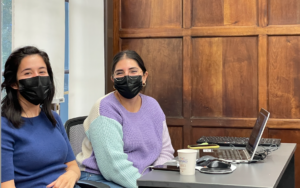
Natalia Cortés and Tamara Palacios, our tech support team.
 Unfortunately, participation in sessions was limited. We missed the usual ambling between venues that happens when everybody comes and cannot go back to their classes or offices in mid conference. But fortunately, all the sessions had a mixed audience, many interesting questions were asked and answered, and the logistics worked fine, thanks to my worthy colleagues at the Universidad Alberto Hurtado. All sessions ended with comments and exchanges that left us thinking and with plans to read ahead.
Unfortunately, participation in sessions was limited. We missed the usual ambling between venues that happens when everybody comes and cannot go back to their classes or offices in mid conference. But fortunately, all the sessions had a mixed audience, many interesting questions were asked and answered, and the logistics worked fine, thanks to my worthy colleagues at the Universidad Alberto Hurtado. All sessions ended with comments and exchanges that left us thinking and with plans to read ahead.
Due to the small number that finally came, we were able our two meeting rooms at the Social Sciences building. We had great time during sessions, coffee breaks, the Thursday reception at our patio and a joyful Friday dinner at El Castillo Forestal (The Forest Castle), a cozy French-Chilean restaurant overlooking the Fine Arts Museum and a park paved with brown and yellow autumn leaves.
After the conference, a group accepted my invitation to walk to the museum and the surroundings of the La Moneda government house and the Museum of Memory and Human Rights. It was quite an emotional experience for me to share the dark history and the hope of change in the Southern Cone with colleagues from the US, Canada, Belgium, Mexico, Poland and Germany.
We managed to do all this thanks to my boss, the director of the Journalism Department Ximena Orchard, the secretary of the Dean of Social Sciences Elizabeth Lizama, and the former students who managed with fine professionalism and a splendid sense of humor the problems we faced: Natalia Cortés and Tamara Palacios.
Special thanks are due to the IALJS governing team, most of whom came to Chile and others helped immensely from their home towns; among others, the wonderful Rob Alexander, Lindsay Morton, Tobias Eberwein, Kevin Lerner, Jeff Neely, Bill Reynolds, Alice Trinidade, Isabel Soares, Isabelle Meuret, Kate McQueen, and Sac-Nicté Guevara Calderón. You can read in detail about IALJS annual business in the meeting minutes, also published online under the newsletter tab.
Finally, a few words of compliment to the director general of the Gabriel García Márquez Foundation, Fundación Gabo, Jaime Abello, who graced our inauguration ceremony with words from his role as leader of an association that is recognized as the common home of long-format journalists in all Spanish and Portuguese-speaking countries, and to our keynote speaker, the investigative reporter, narrative journalist and professor Pascale Bonnefoy. Many participants came after her conference to tell me that they had found her talk on how to write terrible stories of crimes and human rights violations with art and humanity both moving and inspiring.
Hosting a IALJS conference is something one does only once in a lifetime. I was so honored to be the host at this unique time… and I’m also happy to look forward to our 2023 conference in Gdansk, where I will be nothing more or less than a carefree participant!
Credits
Cover image: IALJS members enjoy a post-conferece tour the Museum of Memory and Human Rights with Roberto Herrscher. Photo courtesy of Natalia Cortés.
In-text photos courtesy of Kate McQueen.
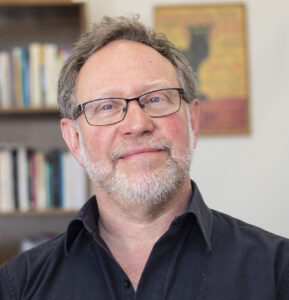 Roberto Herrscher is an Argentine writer, journalist and professor of journalism at the Universidad Alberto Hurtado in Chile. He also directs the Post Graduate Degree Program in Narrative Non-Fiction. Herrscher is the author of Los viajes del Penélope (Tusquets, 2007); Periodismo narrativo (Barcelona University Press, 2012); El arte de escuchar (Barcelona University Press, 2015); Crónicas bananeras (Tusquets, 2021) and Contar desde las cosas (Ed. Carena, Spain, 2021).
Roberto Herrscher is an Argentine writer, journalist and professor of journalism at the Universidad Alberto Hurtado in Chile. He also directs the Post Graduate Degree Program in Narrative Non-Fiction. Herrscher is the author of Los viajes del Penélope (Tusquets, 2007); Periodismo narrativo (Barcelona University Press, 2012); El arte de escuchar (Barcelona University Press, 2015); Crónicas bananeras (Tusquets, 2021) and Contar desde las cosas (Ed. Carena, Spain, 2021).
